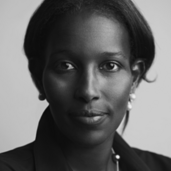Ayaan Hirsi Ali is a research fellow at the Hoover Institution and founder of the AHA Foundation. She served as a member of the Dutch Parliament from 2003 to 2006.
She was born in Mogadishu, Somalia in 1969. As a young child, she was subjected to female genital mutilation. As she grew up, she embraced Islam and strove to live as a devout Muslim. But she began to question aspects of her faith. One day, while listening to a sermon on the many ways women should be obedient to their husbands, she couldn't resist asking, "Must our husbands obey us too?"
In 1992 Ayaan fled to the Netherlands to escape a forced marriage. There she was given asylum, and in time citizenship. She quickly learned Dutch and was able to study at the University of Leiden, earning her M.A. in political science. Working as a translator for Somali immigrants, she saw first hand the inconsistencies between liberal, Western society and tribal, Muslim cultures.
From 2003 to 2006, Ayaan served as an elected member of the Dutch parliament. While in parliament, she focused on furthering the integration of non-Western immigrants into Dutch society, and on defending the rights of Muslim women.
In 2004 Ayaan gained international attention following the murder of Theo van Gogh. Van Gogh had directed her short film Submission, a film about the oppression of women under Islam. The assassin, a radical Muslim, left a death threat for her pinned to Van Gogh's chest.
In 2006, Ayaan had to resign from parliament when the then Dutch minister for Immigration decided to revoke her citizenship, arguing that Ayaan had misled the authorities at the time of her asylum application. However, the Dutch courts confirmed that Ayaan was indeed a legitimate Dutch citizen, leading to the fall of the government. Disillusioned with the Netherlands, she subsequently moved to the United States.
In 2007, Ayaan founded the AHA Foundation to protect and defend the rights of women in the US from harmful traditional practices. Today, the Foundation is the leading organization working to end honor violence that shames, hurts, or kills thousands of women and girls in the U.S. each year, and puts millions more at risk.
Ayaan was a Fellow with the Future of Diplomacy Project at the Belfer Center for Science and International Affairs at The Harvard Kennedy School and a member of the Council on Foreign Relations. Ayaan is currently researching the relationship between the West and Islam. She has to live with round-the-clock security, as her willingness to speak out and her abandonment of the Muslim faith have made her a target for violence by Islamic extremists.
Ayaan Hirsi Ali was named one of TIME Magazine's "100 Most Influential People" of 2005, one of the Glamour Heroes of 2005 and Reader's Digest's European of the Year for 2005. She is the best selling author of Infidel (2007) and Heretic: Why Islam Needs a Reformation Now (2015).

